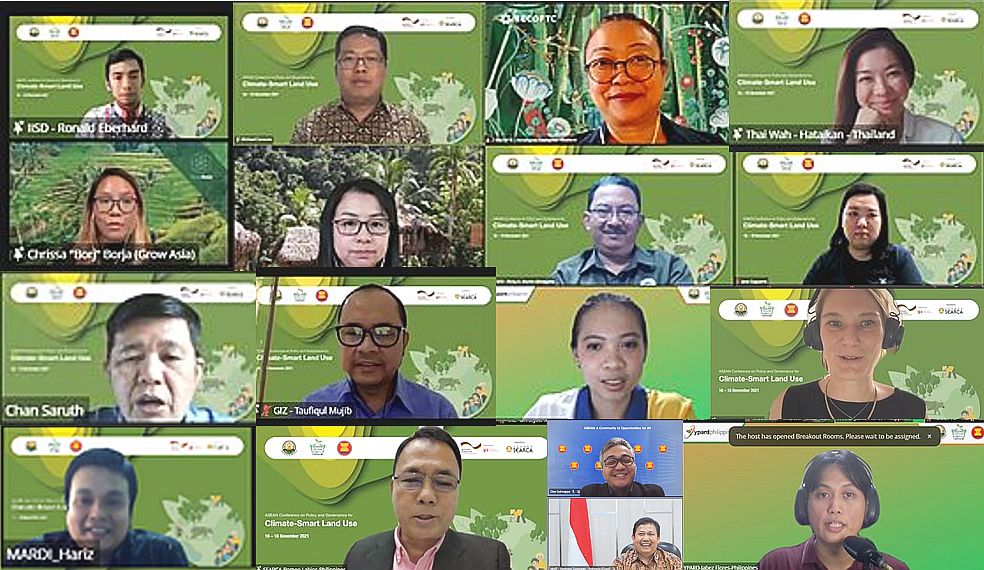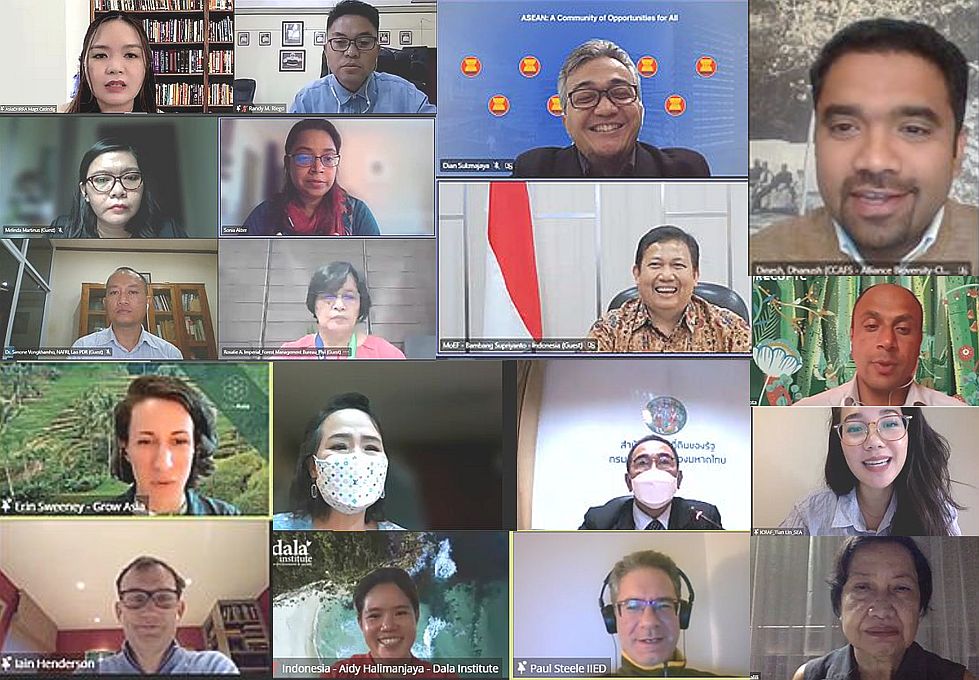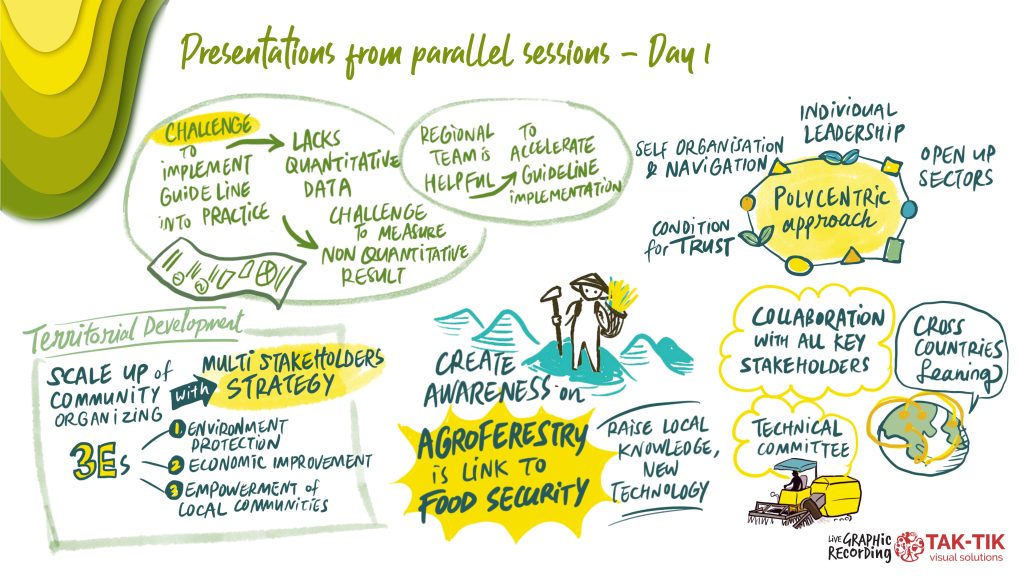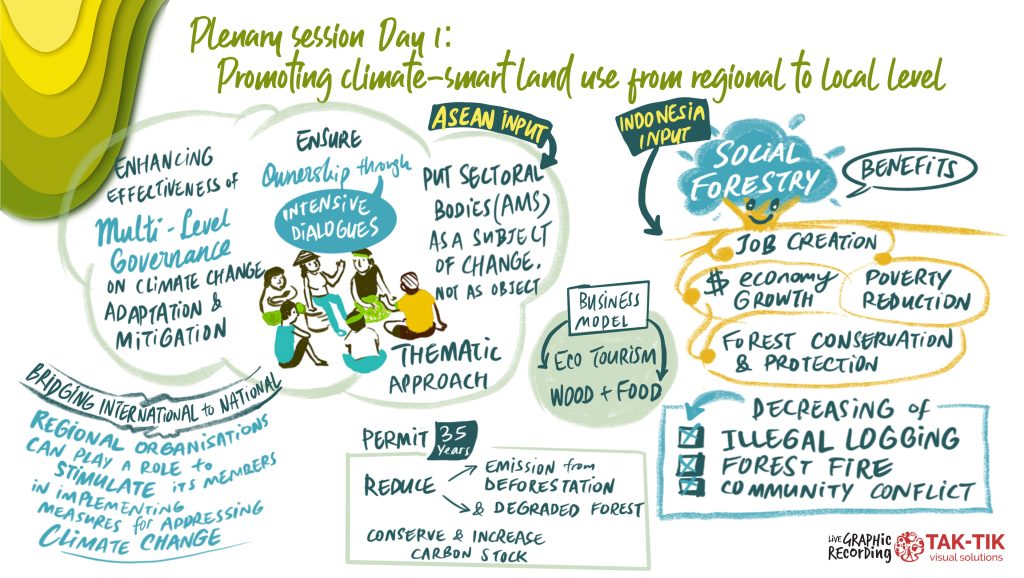
The Department of Agriculture Thailand on behalf of the ASEAN Climate Resilience Network (ASEAN-CRN) and partner organisations hosted the online ASEAN Conference on Policy and Governance for Climate-Smart Land Use between 16-18 November 2021 with a focus on promoting a systemic approach to the interlinkages between policy, governance, climate change and land use.
The conference aimed to increase knowledge about strategies, policies and governance frameworks for promoting the development, adoption and upscaling of climate-smart land use practices at local, national and regional level in the ASEAN region. Policymakers and experts, including those from the private sector, young people, Indigenous Peoples and women’s organisations working on food agriculture and forestry, rural development and on environmental issues, shared successful approaches and lessons learned in the Southeast Asia region. Some 192 participants attended the three-day virtual conference.
Representing the host of the conference and acting as the Chair of ASEAN-CRN, Mr Surakitti Srikul, Senior Expert in Crop Production with the Department of Agriculture in Thailand’s Ministry of Agriculture and Cooperatives, opened the conference. In his welcoming remarks, he highlighted the importance of the conference in raising awareness of the available regional policy tools, such as the ASEAN Guidelines for Promoting Climate-Smart Agriculture (CSA) Practices and the ASEAN Guidelines on Promoting Responsible Investment in Food, Agriculture and Forestry.
‘We believe that the outcomes of the conference will help to further enrich and inspire regional dialogue and cooperation and inform the implementation of ASEAN strategies, such as the ASEAN Comprehensive Recovery Framework’, Mr Srikul emphasised.
He also highlighted that the conference is one of many examples of how ASEAN-CRN is promoting regional exchange, knowledge sharing and cooperation in the ASEAN region to support the implementation of sustainable practices in food, agriculture and forestry. The message was echoed by Dr Pham Quang Minh, Head of the Food, Agriculture and Forestry Division (FAFD) within the ASEAN Secretariat, who also provided insights into current ASEAN priorities and processes for promoting climate-smart land use.
Day 1: Multi-level governance for climate-smart land use
In his keynote speech, Dr Dhanush Dinesh of the Climate Change, Agriculture and Food Security (CCAFS) research programme set out the challenges posed by climate change and, more recently, the COVID-19 pandemic and their implications for the food system in Southeast Asia. Against this background, he emphasised the importance of climate-smart land use in ASEAN and the role of governance in this regard. He observed that a more systemic view is now being taken of the challenges and approaches related to climate change and land use. Reporting on the very recent climate change negotiations in Glasgow, he called for a new mission orientation to innovation, research and cooperation to unlock the agriculture’s potential to solve the climate crisis.
In the following plenary session, on promoting climate-smart land use from regional to local level, Dr Dian Sukmajaya of the ASEAN Secretariat’s FAFD presented the regional framework for food, agriculture and forestry. He emphasised that ASEAN has a role to play in bridging the gap between international and national policies but noted the need for ownership and participation by national governments as the key drivers for regional change. Citing the example of promoting social forestry through agroforestry in Indonesia, Dr Bambang Supriyanto of Indonesia’s Ministry of Environment and Forestry illustrated how different levels of government, from regional to sub-national, successfully promote climate-smart practices. As an important key takeaway, he argued that when a government gives trust and secure land use rights to communities, it also motivates local stakeholders to protect their natural resources.
After the plenary, participants opted for one of three parallel sessions in which different host organisations made presentations about specific approaches and methodologies for and experiences with multi-level governance and agriculture and forestry. The first group, hosted by the Food and Agriculture Organization of the United Nations (FAO), discussed polycentric governance using the example of ASEAN-CRN. The second group, hosted by the Asian Partnership for the Development of Human Resources in Rural Asia (AsiaDHRRA), introduced the territorial development approach, including examples from different ASEAN Member States. The third group, hosted by the Center for International Forestry Research (CIFOR) and World Agroforestry (ICRAF), also focused on the topic of agroforestry and explored further how the ASEAN Guidelines for Agroforestry Development have been put into practice in different countries.

Day 2: Inclusive and participatory policy-making for the promotion and adoption of climate-smart land use
The roles of women, young people, local communities, and Indigenous Peoples as agents of change were highlighted during day 2 of the conference. During the plenary session on engaging marginalised groups in policy development and implementation, the perspectives of government representative and civil society were presented. Mr Ricky Alisky Martin from the Sabah Forestry Department of Malaysia and Mr Randy Riego from the Local Government of San Francisco in the Philippines shared examples how their institutions involve different stakeholder groups in policy-making and implementation processes. A key consideration in this regard is to recognise heterogenous groups and their different needs and interests, especially those of marginalised groups.
Exploring the topic from the perspective of selected stakeholder groups, Ms Kanokporn Deeburee from the Citizens’ Forest Network within the Center for People and Forests (RECOFTC) and Ms Nittaya Earkana, Executive Council Member of the Asia Indigenous Peoples Pact (AIPP) highlighted that women and Indigenous Peoples are very vulnerable to the effects of climate change but also have knowledge relevant to addressing it. They described ways of empowering these groups, for example through targeted capacity building, ensuring their representation on decision-making processes and creating safe spaces for engagement.
Finally, participants learned more about the ASEAN policy framework in relation to the needs and capacities of local communities and marginalised stakeholders through input from Ms Wasana Techavijitsarn from the Senior Officials Meeting on Rural Development and Poverty Eradication (SOMRDPE).
Reflection on the engagement of different groups in policy-making then continued in the parallel sessions. In group 1, hosted by SEARCA through its Research and Thought Leadership Department (RTLD) and the Women’s Business Council Philippines, Inc. (WomenBizPH), different initiatives by women’s groups to promote businesses and develop markets for climate-smart and sustainable approaches to food production were presented. Group 2, hosted by Young Professionals for Agricultural Development (YPARD), noted that young people are perceived as tech-savvy and so are well-placed to promote the convergence of innovation and participation in policy-making. Discussion also centred on how technology provides new perspectives, a platform for empowerment, especially for farmers and communities through data/information, and inputs for evidence-based policymaking. Finally group 3, hosted by the Center for People and Forests (RECOFTC), discussed participatory processes in climate-smart land use in ASEAN Member States, citing practices from Indonesia, Lao PDR, Thailand and Viet Nam. It was noted in particular that involving local communities in planning and development stage is crucial. This will improve understanding and success of the policy implementation in social forestry and forest landscape restoration, while also improving livelihoods and the environment. Before the closing of the day, Dr Romeo Labios from SEARCA shared an update on volume 3 of the ASEAN Regional Guidelines for Promoting Climate-Smart Agriculture (CSA) Practices. These ASEAN Guidelines have been a critical policy in bringing forward the agriculture, forestry and food security agenda in the ASEAN Member States
Day 3: Enabling an environment for private investments in climate-smart land use
The final day of the conference opened with a call for urgent action by the two keynote speakers Mr Paul Steele from the International Institute for Environment and Development (IIED) and Dr Aidy Halimanjaya from the Dala Institute. Referring to the 26th Conference of the Parties (COP26) in Glasgow, they reiterated the concern that time for addressing climate change is running out and there is a need for more radical stances and action. They then opened a discussion about how the transition to more sustainable practices in food, agriculture and forestry can be financed, placing particular emphasis on the role of private investments.
Following this input, Ms Hataikan Kamolsirisakul from Thai Wah Public Company Limited and Mr Iain Henderson from the ADM Capital Foundation introduced their companies’ approaches to applying environmental, social, and governance (ESG) criteria to their operations. Dr Chan Saruth from Cambodia’s Ministry of Agriculture, Forestry and Fisheries explained how the Conservation Agriculture and Sustainable Intensification Consortium (CASIC) facilitates collaboration on promoting conservation agriculture in Cambodia between different market actors, including farmers, agriculture cooperatives and financial institutions. All three speakers discussed their views of how governments can create an enabling environment for sustainable private investments in many ways, such as by clarifying land tenure, aligning subsidies with sustainable development objectives, promoting green financial instruments and creating platforms for fostering cooperation.
To close the discussion of this topic, Mr Ronald Eberhard from the International Institute for Sustainable Development (IISD) and Ms Chrissa Marey Borja from Grow Asia explained how the ASEAN Guidelines on Promoting Responsible Investment in Food, Agriculture and Forestry have been developed and are now being used by ASEAN Member States.

Reflection and promoting climate-smart practices in ASEAN
To round off and bring together the reflections from the entire conference, a panel of experts provided their personal reflections, including Mr Mohammad Hariz Bin Abdul Rahman from the Malaysian Agricultural Research and Development Institute (MARDI), Ms Imelda Bacudo from the Global Alliance for Climate Smart Agriculture (GACSA), and Dr Glenn B Gregorio from SEARCA. Some of their key takeaways were that farmers should be at the centre of CSA practices and should be supported by financial access and digital connectivity. Different concepts are used within the land use sector, including CSA, nature-based solutions and integrated water resources management, among many others, which will need synthesis or ‘connecting the dots’ for better climate-smart land use practices. This also requires an appropriate combination of socially acceptable technical and traditional methods. There is a need for a more systemic approach to climate challenges and to ensure that ‘solidarity’ and ownership is translated into polycentric approaches at ASEAN level, as showcased by the experiences of ASEAN-CRN and the ASEAN Guidelines on Promoting Responsible Investment in Food, Agriculture and Forestry
In his final reflect, Dr Gregorio reminded participants ‘We need to outsmart climate change.’

For the closing session, Dr Margaret C Yoovatana from the Thai Department of Agriculture and Dr Pham Quang Minh from ASEAN Secretariat described how ASEAN will continue to promote dialogue and action for climate-smart land use. Finally, Ms Hanna Reuter from GIZ and representing the conference organising team, assured the meeting of continued support from the Deutsche Gesellschaft for Internationale Zusammenarbeit (GIZ) as part of ASEAN-German cooperation on food, agriculture and forestry. She thanked all the stakeholders involved in the conference as well as the participants.
The conference was supported by the Climate-Smart Land Use in ASEAN (CSLU) project with funding from the German Federal Ministry for Economic Cooperation and Development (BMZ) and implemented by GIZ. SEARCA and several other partner organisations contributed to the event by providing organisational support and expertise.
Event documentation:
ASEAN Conference on Policy and Governance for Climate-Smart Land Use
For registered participants, the password to access the page has been circulated.
Relevant news:
Coming up in November 2021: ASEAN Conference on Policy and Governance for Climate-Smart Land Use

